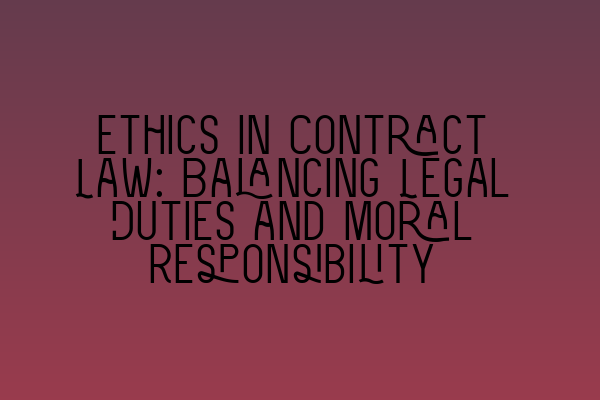Ethics in Contract Law: Balancing Legal Duties and Moral Responsibility
In the realm of contract law, legal professionals are often faced with the complex task of balancing their legal duties with their moral responsibility. While the law provides a framework for conducting business transactions and protecting the rights of parties involved, ethical considerations play a crucial role in shaping the decision-making process.
At SQE Contract Law, we recognize the significance of ethical conduct in contract law and the implications it has for both legal professionals and their clients. In this blog post, we will explore the importance of ethics in contract law, the challenges it presents, and the strategies for effectively balancing legal duties and moral responsibility.
Why are Ethics Important in Contract Law?
In contract law, ethics serve as a guiding principle for legal professionals to ensure fairness, justice, and integrity in their dealings. Ethical behavior helps in maintaining trust and confidence between parties, preserving the reputation of the legal profession, and upholding the fundamental values of society.
By adhering to ethical principles, legal professionals can establish a solid foundation for long-lasting and mutually beneficial relationships with their clients. Upholding ethics also fosters transparency, accountability, and professionalism in the legal practice.
The Challenges of Balancing Legal Duties and Moral Responsibility
While the law provides a set of rules and guidelines for contract formation and enforcement, it may not always align with an individual’s moral values or societal expectations. This misalignment presents a significant challenge for legal professionals who must navigate through complex ethical dilemmas in their everyday practice.
Some of the common challenges faced by legal professionals in balancing legal duties and moral responsibility include:
- Conflicts of Interest: Legal professionals often find themselves in situations where their duties to multiple clients or parties conflict with each other. Managing these conflicts while upholding ethical standards can be a delicate task.
- Unequal Bargaining Power: Contracts are often entered into by parties with varying degrees of bargaining power. Legal professionals must ensure fairness and protect the rights of vulnerable parties, even if it means going beyond their strict legal obligations.
- Unconscionable Contracts: It is not uncommon for contracts to contain clauses that are deemed unfair or unconscionable. Legal professionals must assess the ethical implications of such clauses and advise their clients accordingly.
Strategies for Balancing Legal Duties and Moral Responsibility
Despite the challenges, legal professionals can adopt certain strategies to effectively balance their legal duties and moral responsibility:
- Continued Education and Professional Development: Staying updated with the latest legal and ethical developments is essential for legal professionals. By participating in SQE 1 and SQE 2 preparation courses, they can enhance their knowledge and understanding of ethical issues in contract law.
- Sound Judgment and Critical Thinking: Legal professionals must exercise sound judgment and critical thinking skills when faced with ethical dilemmas. They should analyze the legal and moral implications of their decisions to arrive at a well-informed resolution.
- Open Communication: Maintaining open and honest communication with clients is crucial. Legal professionals should create a safe space for clients to express their concerns and expectations, allowing for better alignment of legal duties and moral responsibility.
- Collaboration and Consultation: Seeking advice and collaborating with colleagues can help legal professionals gain different perspectives on ethical challenges. Discussing potential solutions collectively ensures a more holistic approach to ethical decision-making.
By incorporating these strategies into their practice, legal professionals can strive to strike the delicate balance between their legal duties and moral responsibility.
Conclusion
Ethics in contract law play a vital role in ensuring fairness, integrity, and accountability in legal practice. Despite the challenges faced in balancing legal duties and moral responsibility, legal professionals can navigate through ethical dilemmas by continuing their education, exercising sound judgment, fostering open communication, and seeking collaboration.
At SQE Contract Law, we recognize the importance of ethical conduct and its impact on contract law practice. Through our SQE 1 preparation courses and SQE 2 preparation courses, we equip legal professionals with the necessary skills and knowledge to effectively navigate ethical challenges in contract law.
For more information on SQE exams, mock tests, and preparation courses, visit:
